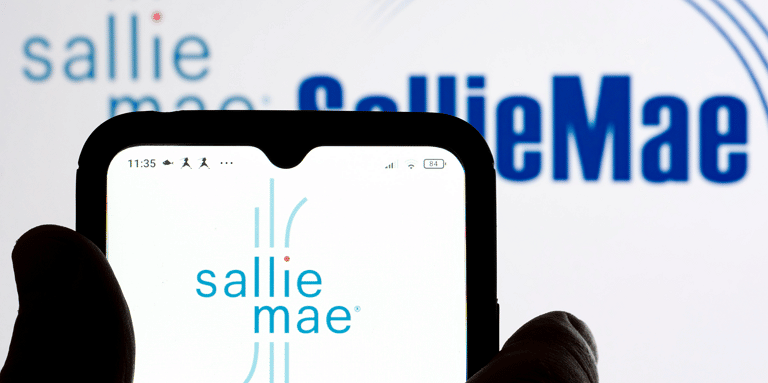When it comes to private student loans, Sallie Mae is one of the most popular lenders in the country. In fact, the company originated $5.4 billion in private student loans in 2021. Sallie Mae offers a variety of loan options, and its loans can be used by both undergraduate and graduate students.
Although its loans can be useful financing options for some students, they aren’t a good fit for everyone. Learn more about the lender’s pros and cons in this Sallie Mae student loans review.
What Is Sallie Mae?
Sallie Mae is a private student loan lender based in Newark, Delaware.
Although the company has been around for over 40 years, the company that operates as Sallie Mae, the SLM Corporation, was only formed in 2013. Sallie Mae legally separated from Navient, another student loan company that provides student loan servicing and student loan consolidation.
Today, Sallie Mae offers a range of student loans. Sallie Mae also has a variety of other financial products, such as credit cards, savings accounts, and certificates of deposit (CDs).
Pros and Cons of Sallie Mae Student Loans
Sallie Mae stands out from some other lenders because of its loan options, but it may not be the best choice for everyone. Carefully consider the pros and cons before applying for Sallie Mae student loans:
Pros
- Sallie Mae gives borrowers extra features: When you take out a loan from Sallie Mae, you can take advantage of extra benefits. Perks include a four-month free subscription to the tutoring site Chegg and a 0.25% autopay discount.
- Disability discharge is available: Policies about death and disability and loan status vary by lender, and not all private student loan lenders forgive your loans if you become disabled. However, Sallie Mae will waive the remaining loan balance if the student borrower dies or becomes totally and permanently disabled.
- Sallie Mae has deferment options: Sallie Mae allows you to defer your loans if you return to school, attend graduate school, or take on an internship or fellowship. During the deferment period, your loan payments are temporarily paused.
- Cosigner release available after 12 months: Although many lenders offer cosigner releases, you typically cannot apply for one until after you’ve made payments for three or four years. But with Sallie Mae, you may be eligible for a cosigner release in as little as 12 months.
Cons
- Sallie Mae charges late fees: Not all private lenders charge late fees, but Sallie Mae does. For its undergraduate loans, the late fee is $25 or 5.00% of the late payment amount, whichever amount is less.
- There are no loan prequalification options: Many lenders allow you to get personalized rate quotes with prequalification tools that only use a soft credit inquiry, which doesn’t affect your credit score. However, Sallie Mae doesn’t have that feature. You must complete an application and consent to a hard credit inquiry to view your loan options and check your eligibility.
- Sallie Mae may have higher rates than you can find elsewhere: Borrowers with excellent credit —or that have creditworthy cosigners — may be able to find loans with lower interest rates elsewhere. As of July 8, 2022, Sallie Mae’s lowest-possible rate was 2.00%, whereas some other lenders have rates as low as 0.94%.
- Sallie Mae doesn’t offer student loan refinancing: Private student loan lenders often offer both private student loans and student loan refinancing However, Sallie Mae discontinued its consolidation business, so you’ll have to work with another lender to refinance existing student loans.
Sallie Mae Student Loans: Available Options
Whether you’re planning on earning a bachelor’s degree, a Master of Business Administration degree (MBA), or you want to attend law school, Sallie Mae has student loan options that can help you finance your education.
College Student Loans
Sallie Mae’s college student loans are for students attending college to pursue a bachelor’s degree, master’s, or professional degree. Sallie Mae also has options for parents looking to borrow money to pay for their children’s education.
- Undergraduate Loans: Through Sallie Mae, students in undergraduate programs can borrow up to the total cost of attendance. Loan terms range from five to 15 years.
- Graduate Loans: If you are going to graduate school to earn a master’s degree, you can borrow up to the total cost of attendance through Sallie Mae. All graduate school loans have a 15-year term and a six-month grace period.
- Law School Loans: If you intend to go to law school, Sallie Mae’s law school loans have 15-year repayment terms. You can take advantage of up to 48-month deferments for clerkships or fellowships, and law school loans have nine-month grace periods.
- MBA Loans: MBA loans have a six-month grace period, and you may also take advantage of a special payment plan that allows you to temporarily make interest-only payments after graduation.
- Dental or Medical School Loans: If you plan on attending dental or medical school, Sallie’s Mae dental or medical school loans offer special benefits like 48 months of deferment during your residency or fellowship and a 36-month grace period.
- Parent Student Loans: Unlike other parent loans that can only be used to pay for a child’s undergraduate degree, Sallie Mae’s parent loans can be used to help your child pay for college, graduate school, or career training programs.
Profession-Specific Student Loans
With Sallie Mae, you can take out loans to cover your expenses as you complete your professional training.
- Career Training Loans: Many student loan lenders only offer loans to students in four-year programs. But Sallie Mae allows you to borrow money for career training programs, such as technical schools and certificate programs. You can borrow up to the total cost of attendance and have up to 15 years to repay your loan.
- Dental and Medical Residency Relocation Loans: These loans can be used for your dental or medical residency exam fees, travel costs, and any moving expenses you may incur for your residency. You can borrow up to $30,000, and the repayment term is 20 years.
- Bar Study Loans: Bar study loans are for law school students preparing to take the bar exam. It covers the cost of study materials, examination fees, and living expenses while you study. You can borrow up to $15,000, and the repayment term is 15 years.
Sallie Mae Repayment Plans
With some private student loans, you are required to begin making payments while you’re in school. For college students trying to manage their coursework, that can be a significant burden.
With Sallie Mae, you have more options. Available repayment plans vary based on the type of loan you take out, but borrowers usually have the following options:
Immediate Repayment
Best For: Immediate repayment is best for students that want to decrease their overall repayment cost. It’s a good option for students that are working while in college or that have family members helping them with their bills.
With immediate repayment, Sallie Mae requires you to make payments against the principal and the interest right after loan disbursement. This option requires you to make higher payments while in school, but because you start paying right away, less interest accrues, and your total repayment cost is lower.
Interest-Only
Best For: The interest-only plan is a good choice for students who cannot afford principal and interest payments while in school but want to lower their overall repayment cost.
With the interest-only plan, you make payments against the interest that accrues each month while you’re in school. After you graduate, your payments increase to include the principal and interest.
Interest-only repayment is more expensive than immediate repayment since you don’t pay against the principal while you’re in school, but it has a lower repayment cost than flat payment or deferred payment plans.
Flat Monthly Payments
Best For: Flat monthly payments are best for students that want to chip away at some of the interest that accrues, but still want to keep their obligations relatively low while in school.
If you opt for the flat monthly payment option with Sallie Mae, you’ll pay just $25 per month while you’re in school. Only after you graduate or leave school do you have to make payments against the principal and interest.
Making flat monthly payments has a higher total repayment cost than immediate or interest-only repayment, but it’s less expensive than some other options because you are reducing how much interest accrues while you’re in college.
Deferred Payments
Best For: Borrowers that don’t want to worry at all about their student loans so they can focus on their coursework in college are a good fit for deferred repayment plans.
Under Sallie Mae’s deferred repayment plan, the student makes no payments at all while they’re in school. They only make payments after they graduate or leave school and after their grace periods.
Because you’re not making any payments while in college, the deferred repayment plan has the highest total repayment cost of all four plans. However, some borrowers may find that the higher cost is worth it to avoid stress about payments while in college.
See How Much You Can Save
Student Loan Calculator
View Details
Collapse
Want to know how much your student loan will cost? Check your monthly payment and interest based on your loan’s repayment term and rate.
Results
$127
Monthly Payment
$3,210
Lifetime Interest
Ready to save your money on your student loans? Refinance to a lower rate and more favorable terms with a quick 2-minute rate comparison.
Sallie Mae Student Loan Eligibility Requirements
To qualify for a Sallie Mae student loan, you must meet the following criteria:
- You must be the age of majority in your state
- You must be a U.S. citizen or permanent resident
- Foreign students and Deferred Action for Childhood Arrivals (DACA) students can qualify for a loan if they have a cosigner who is a U.S. citizen
Like other private student loan lenders, Sallie Mae requires borrowers to meet certain income and credit score criteria. Although Sallie Mae doesn’t disclose its minimum income or credit score, the majority of approved borrowers had scores of 700 or higher in 2021.
If you don’t meet the above criteria, you may be eligible for a loan by adding a cosigner with good-to-excellent credit to your application.
How to Apply for a Private Loan from Sallie Mae
While Sallie Mae doesn’t have a prequalification tool, you can apply for a private student loan entirely online.
To get started, click on the “Apply for a Loan” button at the top of your screen. The application will prompt you to enter the following information:
- Your permanent address
- Your Social Security number
- Information about your desired school, such as its name, your intended major, and the type of degree you plan to pursue
- The academic year you require aid
- Requested loan amount
- Other financial aid you expect to receive, such as grants or scholarships
- Information about your employer and income
- The names and contact information for two references
If you are adding a cosigner to your application, your cosigner will have to fill out their own application. The cosigner can also complete the application online.
After you and your cosigner submit your information, Sallie Mae will review your application and determine whether to approve you and the type of interest rate and repayment term to offer you. If you and your cosigner accept the terms, Sallie Mae will send you a loan agreement to review and sign.
Before the loan can be finalized, Sallie Mae will contact your school to certify the funding amount and verify your eligibility. Funds will be disbursed directly to the school. If there is any money left over after paying the school-required fees, the remainder is issued to you.
Sallie Mae Customer Service
Sallie Mae is a huge provider of private student loans. Due to its size, a certain number of complaints are to be expected. If you do have questions or issues with your account, Sallie Mae offers several customer support options.
Sallie Mae Contact Information
Sallie Mae’s customer support team is available via phone or online chat. Live customer service can be reached during the following times:
- Chat: Online Chat
- Monday through Friday from 8:00 a.m. until 8:00 p.m. EST
- Phone: 855-756-5626
- Monday through Friday from 8:00 a.m. until 9:00 p.m. EST
- Saturday from 10:00 a.m. until 2:00 p.m. EST
- Between July 9 and August 27, Saturday hours are 10:00 a.m. until 6:00 p.m. EST
Sallie Mae Student Loan Reviews
On TrustPilot, the company has received just 19 reviews. However, the reviews submitted so far are mostly negative; Sallie Mae’s TrustScore is just 1.8 out of 5. Notably, the reviews are a mix of customers who took out loans and those who applied for credit cards or bank accounts.
In some reviews, customers complained about changing interest rates on their loans, not realizing that they had taken out a variable rate loan. To avoid any costly surprises during repayment, be sure to review your loan documents thoroughly before signing the contract, and make sure you understand the interest rate and fees you accept.
How Does Sallie Mae Compare to Other Lenders?
Sallie Mae is a top private student loan lender, and it has options for undergraduate students, graduate students, parents, and those planning to take the bar exam or complete a medical or dental residency. You can borrow as little as $1,000 or as much as the total cost of attendance, and Sallie Mae has multiple repayment plans to choose from.
However, it’s always a good idea to shop around. How does Sallie Mae stack up against the competition? Here’s how Sallie Mae compares to three other leading student loan companies.
Sallie Mae | Earnest | College Ave | Ascent | |
Loan | ● Undergrad ● Graduate ● Law school ● Medical school ● Medical residency ● Bar study ● Career training ● Parent | ● Undergrad ● Graduate ● Law school ● Medical school ● Parent | ● Undergrad ● Graduate ● Parent ● Career training | ● Undergrad ● Graduate ● Law school ● Medical school ● Coding bootcamps |
Loan Amounts | $1,000 to total cost of attendance (may vary based on loan type) | $1,000 to total cost of attendance (may vary based on loan type) | $1,000 to total cost of attendance (may vary based on loan type) | $2,001 to total cost of attendance (may vary depending on loan type) |
Loan Terms | 5 to 15 years (may vary based on loan type) | 5, 7, 10, 12 or 15 years | 5, 8, 10 or 15 years | 5, 7, 10, 12, or 15 years (may vary based on loan type) |
Repayment Options | Immediate Flat Interest-only Deferred | Immediate Flat Interest-only Deferred | Immediate Flat Interest-only Deferred | Immediate Flat Interest-only Deferred |
Fixed Interest Rates | As low as 3.75% | As low as 3.24% | As low as 3.39% | As low as 3.22% |
Variable Interest Rates | As low as 2.00% | As low as 1.34% | As low as 0.94% | As low as 0.98% |
Late Fees | $25 or 5.00% of the late payment amount, whichever is less | None | $25 or 5.00% of the late payment amount, whichever is less | $25 or 5.00% of the late payment amount, whichever is less |
Is prequalification available? | No | Yes | Yes | Yes |
Does the lender offer student loan refinancing? | No | Yes | Yes | No |
Rates shown are the lowest available as of July 8, 2022. The rates include autopay discounts. | ||||
Earnest
Like Sallie Mae, Earnest offers student loans for undergraduates, graduate or professional school students, parent borrowers, and career training programs. But Earnest offers a longer grace period than Sallie Mae; its borrowers have nine months after leaving school before they have to start making interest and principal payments.
Plus, borrowers have the option of utilizing Earnest’s skip-a-payment feature. If your account is in good standing, you can skip one payment every 12 months. Unlike Sallie Mae, Earnest doesn’t charge late fees, and it has a prequalification option that allows you to check your rates without affecting your credit.
College Ave
College Ave also offers loans for undergraduate students, graduate or professional students, parent borrowers, and career training programs. You can borrow up to the total cost of attendance, and College Ave has four repayment options to choose from: immediate, deferred, interest-only, and flat monthly payments.
College Ave has more repayment terms than Sallie Mae. Rather than only having three, it has four: five, eight, 10, and 15 years.
Unlike Sallie Mae, College Ave does allow borrowers to use a prequalification tool to check their rates. And College Ave has student loan refinancing options for borrowers that want to refinance existing debt.
Ascent Funding
Ascent Funding is a unique lender in that it offers loans specifically designed for borrowers without credit histories or cosigners. Borrowers can qualify for outcome-based loans that are based on their GPA and majors rather than their credit, making it easier for some borrowers to qualify for a loan.
Ascent Funding also has loan options for students attending coding bootcamps, international students, and DACA students. Ascent has a higher loan minimum than Sallie Mae — $2,001 — but students can borrow up to the total cost of attendance. However, Ascent Funding doesn’t have a loan option for parent borrowers.
Like Sallie Mae, Ascent Funding doesn’t allow students to refinance their debt.
Who Is a Good Candidate for Sallie Mae Student Loans?
Sallie Mae student loans are a good option for students and parents who want the ability to choose their own repayment term and in-school payment plan. Sallie Mae has several student loan options, including loans for career training programs and bar study preparation, and it includes extra benefits like autopay discounts and a free Chegg subscription.
However, Sallie Mae doesn’t have a prequalification tool, so you can’t view your rates without affecting your credit score. And borrowers with good credit or a cosigner may find lower interest rates elsewhere.
Before committing to a loan, make sure you review your options and compare rates from other lenders. Purefy’s “Check Today’s Rates” tool makes it simple; fill out one easy form, and you can view rates and loan options from top private student loan lenders.















